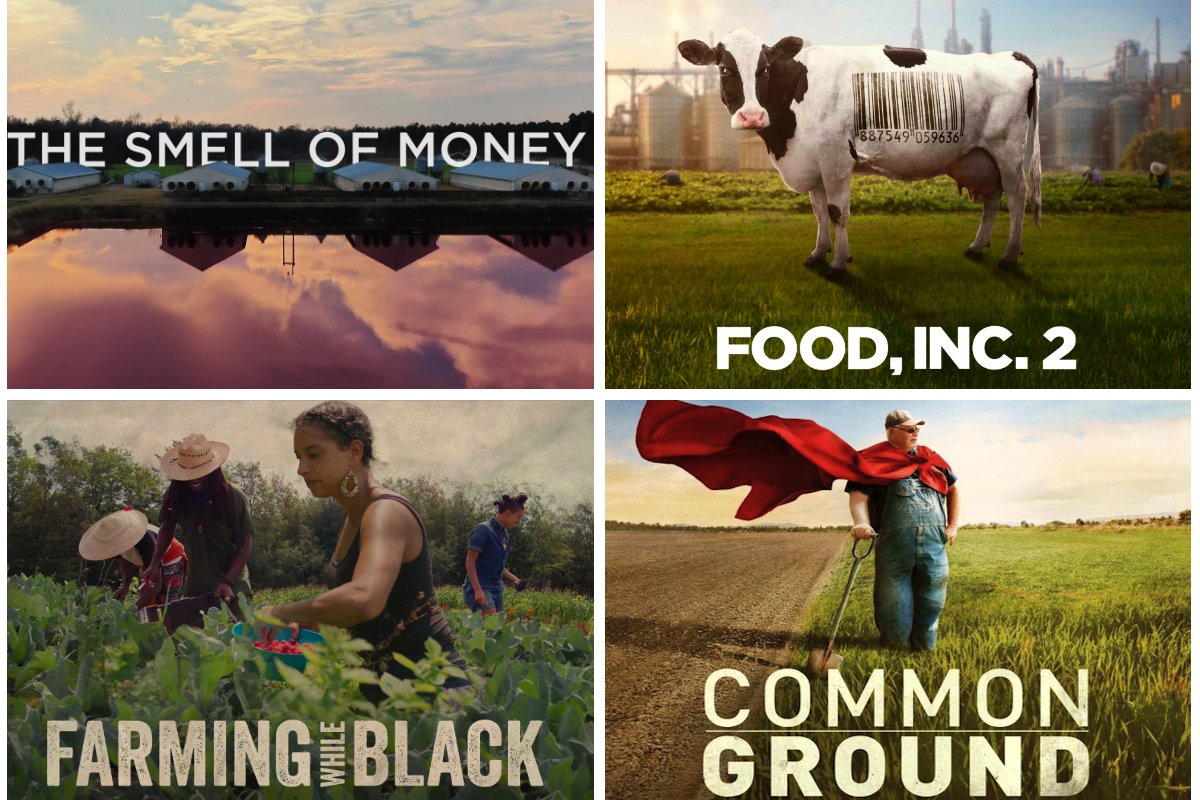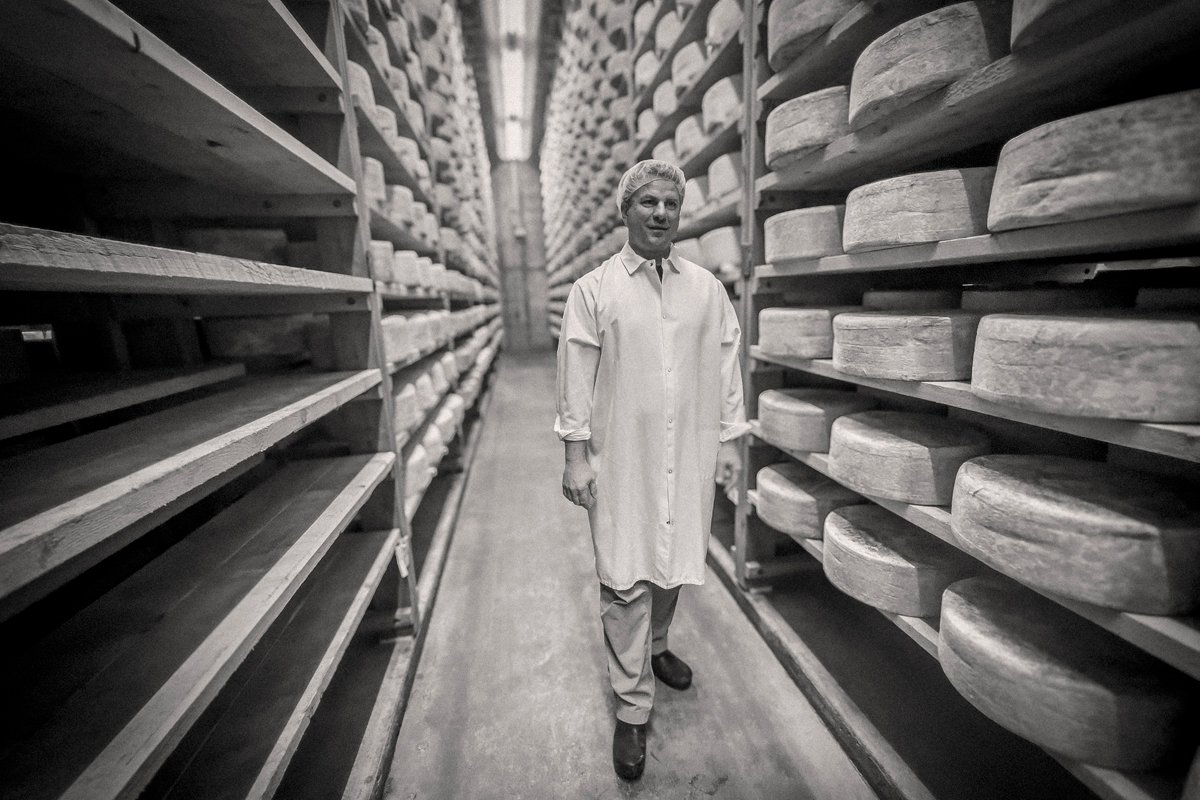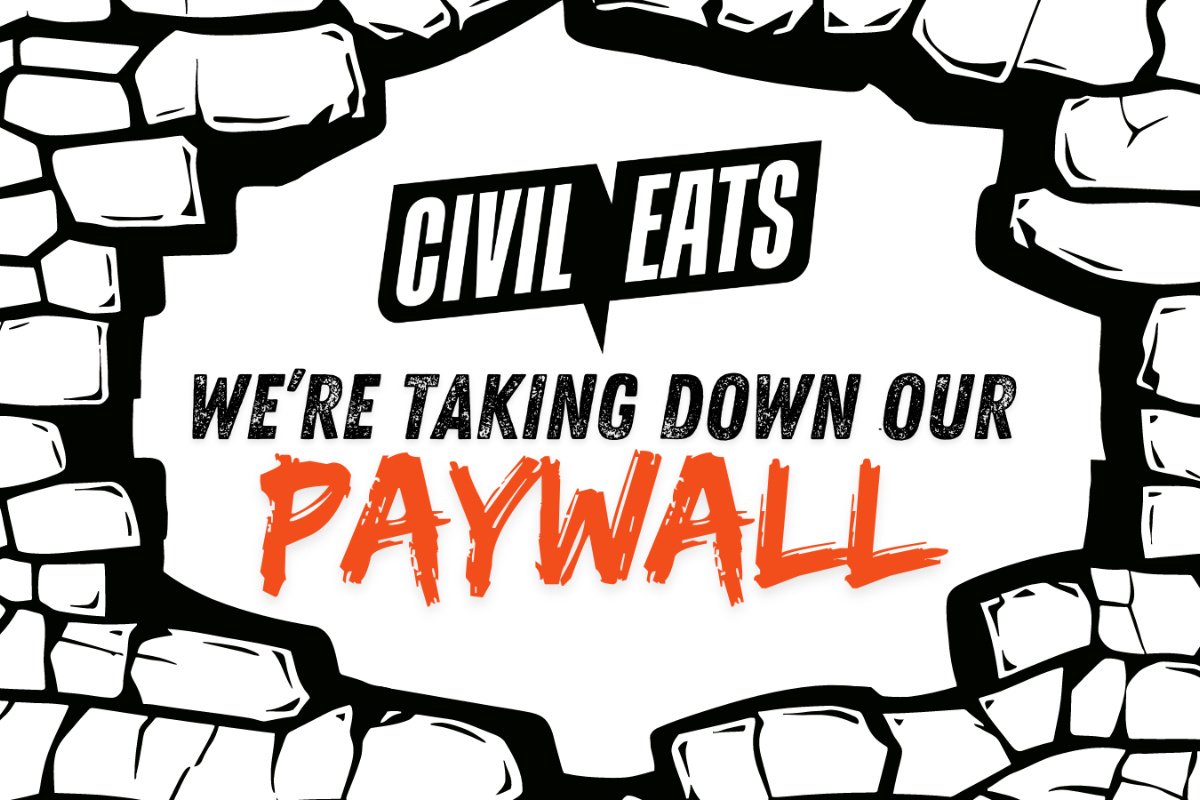In this week’s Field Report, we take a look at the new spate of documentaries on food and agriculture, the latest bird flu casualties, and animal welfare laws that have recently gone into effect.

In this week’s Field Report, we take a look at the new spate of documentaries on food and agriculture, the latest bird flu casualties, and animal welfare laws that have recently gone into effect.
January 10, 2024

In Warsaw, North Carolina, René Miller’s great-great nephews are playing basketball in the yard. The gregarious little boys take a break and begin talking to the crew filming them about the breathing machine Miller uses, especially in the summer when farmers spray the crop fields directly across the street with waste from the surrounding industrial hog farms and her asthma attacks increase. Then, the older boy, Mari, has a question.
“What is this movie even called?” he asks. Off screen, writer-producer Jamie Berger says, with amusement in her voice, that the team hasn’t decided yet. Does he have any ideas?
“Yup,” he says, without missing a beat. “How about, ‘The Hog Farm Stinks?’”
It’s a moment Berger now points to as one of her favorites in the documentary set in the country’s top hog-producing counties—although ultimately the filmmakers went with The Smell of Money.
And it’s a prime example of how the filmmakers gave new, vibrant life to an environmental justice story that had been chronicled by national news organizations—including this one—for years. In the film, Berger and director-producer Shawn Bannon focus on the day-to-day struggles of a group of Black families who are engaged in a lawsuit against Smithfield, one of the biggest industrial pork companies in the world, for polluting their communities in ways that they say have devastated their health, property values, and quality of life.
“We didn’t want to overwhelm people with facts and graphs and talking heads,” Berger told Civil Eats recently. “Our hope is that people will connect with the people in the film and feel empathy for them, feel outrage on their behalf, and understand that this is not just happening in eastern North Carolina, but that we’re all connected to it, whether it’s through what we eat or who we support in terms of our political leaders.”
Now, many people will get that opportunity. While The Smell of Money premiered at film festivals as far back as April 2022, in mid-December it was picked up for streaming by Apple, Prime Video, Google Play, and YouTube.
And its debut coincided with the recent release of a whole new crop of documentaries on food and agriculture. Despite covering different ground, all of them point to ways in which food production is failing or harming Americans and to potential solutions to the problems they identify.
You Are What You Eat: A Twin Experiment, was released on New Year’s Day on Netflix, and presents veganism as a win for health, animals, and the environment. Feeding Tomorrow, which will be released on Apple TV, Amazon Prime, and other streaming services on January 23, proposes developing a “just and regenerative” food system through multiple pathways, including agroforestry, urban farming, and food education.
Overall, Berger said she couldn’t point to why so many filmmakers are currently drawn to farms and supermarkets (although some in the industry have pointed to lingering impacts of the Hollywood writers’ strike stoking streaming services’ demand for documentaries, in general). But, she said she hopes the moment “reflects increased attention on the food system as a source of both environmental harm and a huge opportunity to improve the environment and the experiences of people who live within areas impacted . . . including workers and community members.”
In addition to The Smell of Money, here are three other recent documentaries on American agriculture that are available now or will be coming soon to a theater or streaming service near you.
Leah Penniman’s book of the same name propelled the conversation around the legacy and future of Black farmers forward in an unprecedented way, and this film is a visual representation of her journey. In addition to following her path toward establishing Soul Fire Farm, the filmmakers feature Penniman’s mentor Karen Washington, an urban farming pioneer from the Bronx (who later established a farm in upstate New York), and Blain Snipstal, a co-founder of Maryland’s Black Dirt Farm Collective who coined the term Afroecology.
And while it includes critical history on the long subjugation and discrimination of Black people in American agriculture, the camera lens is focused more toward the future, on how young Black farmers are reclaiming their connections to land and building food sovereignty in their communities. Farming While Black is currently being screened at festivals and future screening and streaming information will be available on its website.
The first Food, Inc. was groundbreaking in its examination of how increasingly powerful food and agriculture businesses were hurting workers, animals, the environment, and eaters in the name of larger profits, and it was nominated for an Oscar in 2008. Fifteen years later, many of the same individuals are back for a follow-up. In Food, Inc. 2, Michael Pollan, Eric Schlosser, and other experts detail how, while some of the issues raised in the first film are now more widely understood, consolidation and industrialization in the food system has continued at a steady clip.
They spend time on the proliferation of ultra-processed foods in recent years and the increasing urgency of building a more climate-friendly and climate-resilient food system. In terms of solutions, the film examines policy efforts to break up corporate power and looks at the pros and cons of tech innovations like lab-grown or “cultured” meat. [Disclosure: I contributed a chapter to the companion book.] Food, Inc. 2 is also only being shown at select screenings so far; interested viewers can sign up for updates on its website.
Another sequel, Common Ground, is the follow-up to Kiss the Ground, the first Hollywood ode to regenerative agriculture, featuring a long list of celebrities including Jason Momoa, Rosario Dawson, and Laura Dern. The first film received accolades for drawing widespread attention to the importance of building soil health to mitigate climate change and achieve other environmental goals. It was also criticized for ignoring the historic and ongoing contributions of Black, Indigenous, and people of color (BIPOC) to regenerative agriculture and for focusing solely on farmers instead of acknowledging the political and systemic conditions that undergird the systems that deplete—instead of regenerate—soil.
Common Ground tackles those criticisms by turning the camera on the “web of money, power, and politics behind our broken food system” and incorporating more diverse voices to investigate what would need to happen to enable the kind of agricultural transformation the filmmakers believe would be necessary to revitalize American soils. It’s currently playing in select theaters around the country.
Read More:
‘Rhythms of the Land’ Preserves the Untold Stories of Black Farmers
Two New Films Paint Starkly Different Pictures of Farming in America
How Mexican Big Soda Advocates Fought Big Soda and Won
Crate-free California—and Beyond. After a rocky few years of lawsuits and delays that ultimately led to the Supreme Court declining to overturn California’s voter-approved farm animal welfare law, Proposition 12 officially went into full effect on January 1, 2024. (Some aspects of the law had already been implemented, but other elements were phased in gradually.) According to California’s Department of Food and Agriculture, there are now 1,250 certified producers and distributors of compliant pork, veal, and eggs.
At the same time, a similar law in Massachusetts was fully implemented last year. Animal-rights activists and some producers are cheering the progress. But the pork industry has fought tooth and nail against the laws’ requirements—which effectively ban crates used to confine pregnant pigs by dictating the amount of space they need to move—and it is not done pushing back. A group of pork companies have filed a new lawsuit against Massachusetts to overturn its law, and advocacy in Washington has led to two bills being introduced that could invalidate these kinds of state animal welfare provisions all together. Some Republican lawmakers are angling to get language from those bills included in the upcoming farm bill.
Finally, while all certified organic farms would automatically comply with laws that mandate minimum space requirements for pigs, chickens, and calves, a long-awaited set of rules called the Organic Livestock and Poultry Standards are set to raise the bar higher for organic farmers. The rules will officially go into effect on January 12, although most farmers have been given a year to comply. Poultry operations will get four additional years to implement requirements related to indoor and outdoor space.
Read More:
Morality at the Center of Supreme Court Arguments Over Raising Farmed Pigs in Crates
Is the Pork Industry Using Food Justice to Stall California’s New Animal Welfare Law?
Why the Organic Industry Is Suing the USDA Over Animal Welfare
Sick Birds. Over the last few months, the dangerous strain of bird flu—or highly pathogenic avian influenza (HPAI)—that first emerged in early 2022 flared up again, leading to the culling of millions of additional chickens and turkeys. The two-year outbreak is now the deadliest in history, with close to 80 million birds killed as a result, according to the USDA. While wild birds spread the virus and many backyard chicken flocks have also been infected, birds raised in concentrated animal feeding operations (CAFOs) account for the vast majority of the losses because of sheer numbers, the animals’ susceptibility to illness, and close quarters that enable it to spread quickly. Recent losses have been the most dramatic at egg production facilities, including 1.4 million chickens killed at one farm in California in mid-December and 2.6 million in one place in Ohio earlier in the month.
While humans can be infected by the strain, transmission is rare. In a report released just before the new year, the Centers for Disease Control and Prevention (CDC) tracked 19 human bird flu cases globally since the start of the outbreak, only one of which was in the U.S. Of those cases, five patients died and four others had severe illnesses, while 10 cases were mild or asymptomatic. Since the outbreak began, taxpayers have spent more than $1 billion compensating farmers for their losses and helping pay for disposal of the birds.
Read More:
A Deadly Bird Flu Resurfaces
Could Large Livestock Operations Cause the Next Pandemic?
More Cheddar. Organic Valley announced that it added 84 dairy farms to its milk routes in 2023, most of which are located in Northeast and Midwest states where smaller family dairies proliferate. The most farms were added in Pennsylvania, Wisconsin, and New York. The growth of the co-op is noteworthy as small organic dairy farms in the region have struggled to stay afloat over the past decade, and many companies have dropped farms and shifted routes, putting farms out of business.
Read More:
The Dairy Crisis Is Hurting Organic and Grassfed Farms in the Northeast
Losing Danone Contracts Compounds the Dairy Crisis for Small Farms in the Northeast

September 4, 2024
By paying top dollar for milk and sourcing within 15 miles of its creamery, Jasper Hill supports an entire community.
September 3, 2024

August 27, 2024

August 26, 2024

Like the story?
Join the conversation.